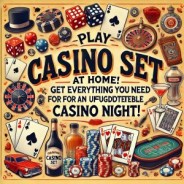8 Tips and strategies on how to master the blackjack game
The thrill of the cards, the rush of the bet, and the sweet taste of victory. Many have tried to outsmart the dealer and walk away with full pockets.
But let’s be honest, winning consistently There are occasions when we here at ReadyBetGo want to bring you interesting facts about the gambling industry When something catches our eye, we will publish it for your enjoyment.
There are occasions when we here at ReadyBetGo want to bring you interesting facts about the gambling industry When something catches our eye, we will publish it for your enjoyment. 
Image: North East Connected isn’t just about luck. It’s a blend of strategy, skill, and a touch of that casino magic.
And, hopefully, you can make your lucky dreams come true by turning the odds in your favor. Let’s get into some tried-and-true tips that’ll have you playing like a pro in no time.
1. Master the Basic Strategy
To thrive at the blackjack table, mastering the basic strategy is essential. This isn’t just theory—it’s the foundation of any serious player’s game. Knowing when to hit, stand, double down, or split based on your cards and the dealer’s upcard is crucial.
While it may seem daunting at first, with practice, it becomes second nature. Start by studying a basic strategy chart. Practice at home with a deck of cards or use online simulators. Soon, you’ll make decisions faster than the dealer can blink.
2. Always Split Aces and Eights
A golden rule is to always split Aces and Eights. Regardless of what the dealer’s showing, splitting these hands can significantly improve your odds. Aces give you a chance at two strong hands, and splitting Eights turns a weak 16 into a fighting chance.
Splitting Aces allows you to potentially hit blackjack on each new hand, maximizing your payout opportunities. On the other hand, splitting Eights transforms a stubborn 16—a notoriously difficult hand—into two separate hands that each have a better chance of reaching a higher total without busting.
3. Avoid Splitting Tens or Fives
Keeping a pair of Tens gives you a strong hand of 20, hard to beat. Similarly, a pair of Fives totals 10, making it preferable to hit or double down rather than splitting them. These decisions can keep you in a strong position.
Splitting Tens often breaks up a powerful hand in the blackjack game (لعبة بلاك جاك) that stands a high chance of winning, reducing your overall potential payout. Maintaining a 20 puts immense pressure on the dealer’s hand, increasing your likelihood of success. Conversely, treating a pair of Fives as a single 10 allows you to leverage the potential of doubling down, capitalizing on favorable dealer upcards to maximize your winnings.
4. Hit on Hard 12 Against Dealer’s 2 or 3
With a hard 12 against a dealer showing a 2 or 3, hitting is often the better choice. Standing in this situation can lead to losses, while hitting gives you a chance to improve your hand.
A hard 12 is a precarious total; it’s not strong enough to confidently stand against certain dealer upcards but substantial enough that hitting carries manageable risks.
If you choose to hit, you aim to draw a small card to bolster your total without busting. That proactive approach increases your chances of reaching a more competitive hand, enhancing your likelihood of winning the round.
5. Hit Soft 18 (A-7) Against Dealer’s 9, 10, or Ace
Many players mistakenly stand on soft 18, but hitting can enhance your hand significantly. If you draw a small card, your hand strengthens, and a ten doesn’t harm your total.
A soft 18 offers flexibility since the Ace can be counted as 1 or 11, reducing the risk of busting. When the dealer has a strong upcard like a 9, 10, or Ace, hitting allows you to potentially improve your hand to a more competitive total.
6. Double Down on 10 Against Dealer’s 9 or Less
Always double down when you have a 10 against a dealer’s 9 or less. This strategy capitalizes on your favorable position and can maximize your winnings.
Doubling down on a total of 10 is advantageous because the probability of drawing a high-value card, such as a 10, significantly boosts your hand towards 20—a formidable total. When the dealer shows a card of 9 or lower, they are in a weaker position, increasing the likelihood that your doubled bet will result in a win.
7. Double Down A-2 to A-7 Against Dealer’s 5 or 6
Doubling down with soft hands (A-2 through A-7) against a dealer's weak upcard (5 or 6) is wise. It increases your chances of winning more when the dealer is likely to bust.
When the dealer shows a 5 or 6, they are in a precarious position with a high chance of busting. By doubling down on a soft hand, you take advantage of this weakness, allowing yourself to draw additional cards that can strengthen your total without the immediate risk of busting due to the Ace’s flexibility.
8. Stand with a Pair of 9s Against Dealer’s 7
When holding a pair of 9s against a dealer’s 7, standing is usually better. Your total of 18 can potentially beat the dealer’s hand.
Standing on 18 is a strong position because it forces the dealer to draw to a total of at least 17, increasing their risk of busting if they must hit. A hand totaling 18 is formidable enough to challenge most dealer hands.
